Hyaluronic acid fuels pancreatic cancer cell growth
- PMID: 34951587
- PMCID: PMC8730721
- DOI: 10.7554/eLife.62645
Hyaluronic acid fuels pancreatic cancer cell growth
Abstract
Rewired metabolism is a hallmark of pancreatic ductal adenocarcinomas (PDA). Previously, we demonstrated that PDA cells enhance glycosylation precursor biogenesis through the hexosamine biosynthetic pathway (HBP) via activation of the rate limiting enzyme, glutamine-fructose 6-phosphate amidotransferase 1 (GFAT1). Here, we genetically ablated GFAT1 in human PDA cell lines, which completely blocked proliferation in vitro and led to cell death. In contrast, GFAT1 knockout did not preclude the growth of human tumor xenografts in mice, suggesting that cancer cells can maintain fidelity of glycosylation precursor pools by scavenging nutrients from the tumor microenvironment. We found that hyaluronic acid (HA), an abundant carbohydrate polymer in pancreatic tumors composed of repeating N-acetyl-glucosamine (GlcNAc) and glucuronic acid sugars, can bypass GFAT1 to refuel the HBP via the GlcNAc salvage pathway. Together, these data show HA can serve as a nutrient fueling PDA metabolism beyond its previously appreciated structural and signaling roles.
Keywords: cancer biology; extracellular matrix; hexosamine biosynthetic pathway; human; hyaluronic acid; mouse; pancreatic cancer; tumor metabolism; tumor microenvironment.
© 2021, Kim et al.
Conflict of interest statement
PK, CH, SK, MR, SW, DK, PS, AA, SH, AT, GT, AA, LY, LS, SW, LZ, MP, KK, HY No competing interests declared, CL has received consulting fees from Astellas Pharmaceuticals and Odyssey Therapeutics and is an inventor on patents pertaining to Kras regulated metabolic pathways, redox control pathways in pancreatic cancer, and targeting the GOT1-pathway as a therapeutic approach (US Patent No: 2015126580-A1, 05/07/2015; US Patent No: 20190136238, 05/09/2019; International Patent No: WO2013177426-A2, 04/23/2015)
Figures
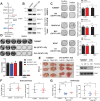
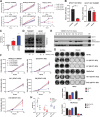
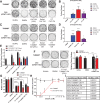
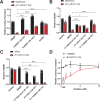

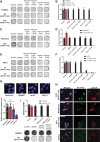



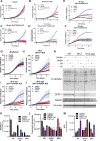
References
-
- Commisso C, Davidson SM, Soydaner-Azeloglu RG, Parker SJ, Kamphorst JJ, Hackett S, Grabocka E, Nofal M, Drebin JA, Thompson CB, Rabinowitz JD, Metallo CM, Vander Heiden MG, Bar-Sagi D. Macropinocytosis of protein is an amino acid supply route in Ras-transformed cells. Nature. 2013;497:633–637. doi: 10.1038/nature12138. - DOI - PMC - PubMed
Publication types
MeSH terms
Substances
Grants and funding
- R01CA237466/CA/NCI NIH HHS/United States
- R00 CA241357/CA/NCI NIH HHS/United States
- P30 CA046592/CA/NCI NIH HHS/United States
- K00 CA264414/CA/NCI NIH HHS/United States
- F99/K00CA264414/CA/NCI NIH HHS/United States
- R01 CA252037/CA/NCI NIH HHS/United States
- F99 CA264414/CA/NCI NIH HHS/United States
- U24 DK097153/DK/NIDDK NIH HHS/United States
- K99 CA241357/CA/NCI NIH HHS/United States
- Predoctoral Fellowship F31CA243344/CA/NCI NIH HHS/United States
- Pathway to Independence Award K99CA241357/CA/NCI NIH HHS/United States
- U24DK097153/NH/NIH HHS/United States
- R37CA237421/CA/NCI NIH HHS/United States
- Cancer Center Support Grant,P30 CA046592/CA/NCI NIH HHS/United States
- Predoctoral Fellowship,F31CA243344/CA/NCI NIH HHS/United States
- R21CA212958/CA/NCI NIH HHS/United States
- Cancer Biology Training Grant,T32AI007413/CA/NCI NIH HHS/United States
- F31CA24745701/CA/NCI NIH HHS/United States
- R01CA248160/CA/NCI NIH HHS/United States
- T32 HD007505/HD/NICHD NIH HHS/United States
- R01CA252037/CA/NCI NIH HHS/United States
- P30 CA008748/CA/NCI NIH HHS/United States
- R01 CA248160/CA/NCI NIH HHS/United States
- R01 CA237466/CA/NCI NIH HHS/United States
- Cancer Center Support Grant,P30CA008748/CA/NCI NIH HHS/United States
- R01 CA244931/CA/NCI NIH HHS/United States
- P30 DK034933/DK/NIDDK NIH HHS/United States
- Postdoctoral Support,P30DK034933/DK/NIDDK NIH HHS/United States
- R21 CA212958/CA/NCI NIH HHS/United States
- Pathway to Independence Award,K99CA241357/CA/NCI NIH HHS/United States
- Postdoctoral Support P30DK034933/DK/NIDDK NIH HHS/United States
- Cancer Center Support Grant P30 CA046592/CA/NCI NIH HHS/United States
- F31 CA243344/CA/NCI NIH HHS/United States
- T32 AI007413/AI/NIAID NIH HHS/United States
- R37 CA237421/CA/NCI NIH HHS/United States
- R01CA244931/CA/NCI NIH HHS/United States
- Cancer Center Support Grant P30CA008748/CA/NCI NIH HHS/United States
- T32 CA140044/CA/NCI NIH HHS/United States

